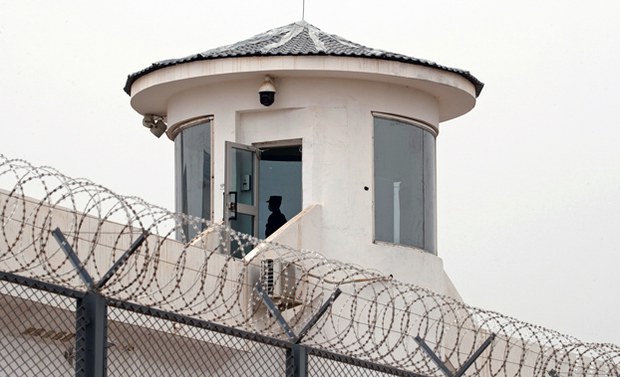50 nations at UN denounce Chinese human rights violations of Uyghurs
Share

A guard stands in a watchtower of Kashgar Prison in Kashgar, northwestern China’s Xinjiang Uyghur Autonomous Region, May 3, 2021.
Fifty nations at the United Nations General Assembly on Monday denounced China for its treatment of Uyghurs and other Muslim minorities in the northwestern Xinjiang region and called on Beijing to end human rights violations there, including arbitrary detention.
The countries, which included the United States and many of its Western allies, constituted the largest group of nations to publicly denounce China’s human rights violations in the region.
The joint statement referred to a key August report released by the U.N. Office of the High Commissioner for Human Rights, or OHCHR, that found that “the scale of the arbitrary and discriminatory detention of Uyghurs and other predominantly Muslim minorities in Xinjiang ‘may constitute international crimes, in particular crimes against humanity.’”
It also cited evidence of the use of invasive surveillance on the basis of religion and ethnicity, severe restrictions on cultural and religious practices, torture, forced abortions and sterilizations, family separations, and forced labor.
“In view of the gravity of the OHCHR assessment, we are concerned that China has so far refused to discuss its findings,” said the joint statement issued by the 50 U.N. member states. It urged China to “uphold its international human rights obligations and to fully implement the recommendations” of the commission’s report.
It called the commission’s report an “independent, authoritative assessment that relies extensively on China’s own records,” and said it “makes an important contribution to the existing evidence of serious and systematic human rights violations in China.”
The report recommended that China release Uyghurs and other Turkic minorities arbitrarily detained in Xinjiang, clarify the fate and whereabouts of missing family members, and facilitate their safe contact and reunion.
In early October, a proposal cosponsored by the United States and Norway that the U.N. Human Rights Council hold a debate on the report’s findings was defeated by China and its allies on the 47-member body.
In response, China’s ally Cuba delivered a joint statement at the U.N. General Assembly on behalf of 66 countries, criticizing what they said was the application of double standards and interference in China’s internal affairs in the name of human rights.
“Campaign of terror”
Human rights groups welcomed the statement, however.
“We thank the 50 nations that have called on the Chinese Communist Party to end its genocidal, Islamophobic campaign of terror against Uyghur Muslims,” said Edward Ahmed Mitchell, deputy director of the U.S-based Council on American–Islamic Relations in a statement issued Tuesday. “It is time for more Muslim-majority nations to also stand up against the CCP’s attempt to erase Islam from the Uyghur region of China.”
New York-based Human Rights Watch urged members of the U.N.’s Human Rights Council to try again to consider options for setting up a U.N.-backed mechanism to investigate further China’s role in rights violations in Xinjiang and recommend ways to hold those responsible for crimes against humanity accountable.
The group noted in a statement issued Monday that the 66 signatories of a pro-China counterstatement at Monday’s U.N. General Assembly constituted “a virtual rogues gallery of serious rights abusers,” such as Russia, Cuba, North Korea, Venezuela, Syria and Eritrea.
“It is now key for the new U.N. High Commissioner for Human Rights, Volker Türk, to publicly take ownership of the OHCHR report and explain how the Office will continue to gather information in pursuit of Chinese government conduct that in OHCHR’s view may constitute crimes against humanity,” Sophie Richardson, the group’s China director, later told RFA.
No veto power
Mehmet Tohti, executive director of Canada’s Uyghur Rights Advocacy Project, told RFA on Tuesday that although China led the way in defeating the proposal for the Human Right Council to debate the finding of the OHCHR report, U.N. member states instead could take measures the U.N. General Assembly.
“As most of the decisions at the General Assembly are decided by majority vote, China’s veto power doesn’t work here,” he said.
Alkan Akad, China researcher at London-based Amnesty International, said it was encouraging to see a growing number of countries speaking out about the human rights situation in Xinjiang and that there must be follow-up on the OHCHR report.
“All the member states have a moral obligation to support proposals, to discuss the themes in the OHCHR report on Xinjiang and to establish an investigatory mechanism for the human rights violations that have been taking place in in the region,” he told RFA on Tuesday.
Zhao Lijian, a spokesman at China’s Ministry of Foreign Affairs, dismissed the joint statement.
“The world has long been clear-eyed about and tired of the farcical shows of few Western countries’ politicization of human rights and double standards,” he told a regular press conference on Nov. 1.
“We urge these countries to stop their condescending lectures and stop using human rights as a pretext for political manipulation, slander and rumor-mongering, and containment and suppression,” he said.
Translated by Mamatjan Juma for RFA Uyghur. Written in English by Roseanne Gerin.







